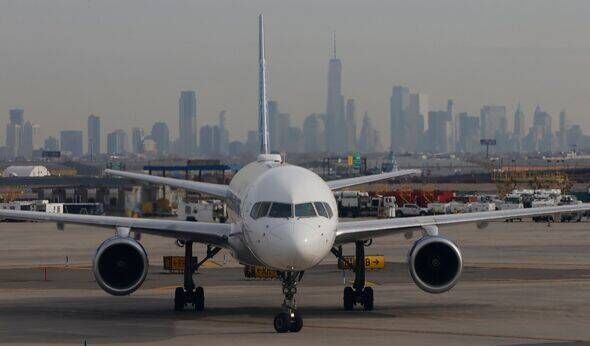Harrowing moment pilot issues urgent plea to air traffic control after 90-second blackout
Air traffic controllers at Newark Liberty International Airport couldn't communicate with pilots or see planes landing on radar last Monday for 90 seconds.

A harrowing audio clip was released that captured the moment air traffic controllers at Newark Liberty International Airport lost contact with incoming flights.
On a recording, one pilot is heard asking, "Approach, are you there?" They were met with an alarming silence.
The communication blackout lasted 90 seconds, during which no incidents were reported at the busy New York City area airport on April 28. It comes as the US updated its 'do not travel' with 21 countries.
- Parents starved 10-year-old child leaving judge speechless
- Dad made friend dig own grave and kill himself after raping 6-year-old daughter
Now, more than a week later, the effects of the incident linger as air traffic controllers took medical leave due to the stress induced by the technological failure, contributing to a cascade of delays and cancellations at the already bustling hub.
On that nerve-wracking day, all equipment vital for monitoring aircraft went offline suddenly, depriving controllers of radar visuals and any means of communicating with pilots.

United Flight 1951 experienced an intense half-minute delay before finally receiving clearance from the resuming tower, which asked, "United 1951, how do you hear me?" The pilot quickly responded, "I got you loud and clear, United 1951." The exchange was documented by LiveATC.net.
The recording revealed the United Airlines pilot's anxious tone as he flew from New Orleans to New York City, the Mirror US reported. His relief was palpable after receiving a response from air traffic control.
On Friday, United Airlines CEO Scott Kirby expressed concerns that Newark Airport is ill-equipped to manage its scheduled flight operations due to staffing shortages in the coming weeks and months.
Recent walkouts by many air traffic controllers, compounded by others taking medical leave, have resulted in severe understaffing at the airport.
That comes as the airport typically accommodates a substantial daily volume of flights.
Over 20% of the airport's air traffic control staff departed their roles in the last few weeks. In response, United announced the cancellation of around 35 daily flights at Newark Airport.
"There is no other choice in order to protect our customers," Kirby stated.
A recent MSNBC interview with an air traffic controller unveiled alarming issues at Newark, leading the controller to declare, "It's not safe. It is not a safe situation right now for the flying public."
The controller concluded by warning MSNBC's Tom Costello, "Don't fly into Newark. Avoid Newark at all costs."
U.S. Transportation Secretary Sean Duffy recently addressed the outage that occurred last week, assuring Fox News that, despite a brief loss of contact with air traffic that there was no risk of planes crashing.
"The primary communication line went down. The backup line didn't fire. And so, for 30 seconds, we lost contact with air traffic," he said. "Now, were planes going to crash? No. They have communication devices," but he admitted that those devices were unable to reach anyone during the incident.
Duffy recognized the situation as indicative of a fragile system, saying, "It's a sign that we have a frail system in place, and it has to be fixed."
Duffy had previously mentioned that he believes there are "cracks in the system" and stressed that it is his department's responsibility "to actually see over the horizon what the issues are and fix it before there is an incident that we will seriously regret."
He also commented on the outdated infrastructure at Newark, revealing, "We use floppy disks. We use copper wires."
"The system that we're using is not effective to control the traffic that we have in the airspace today," he said.
The Federal Aviation Administration attributed the ground delays at Newark to both a shortage of workers and ongoing runway construction.
Since April 28, thousands of flights have been delayed, and on Tuesday, the FAA implemented a ground delay for all incoming flights to Newark, averaging a delay time of two hours and 41 minutes.
